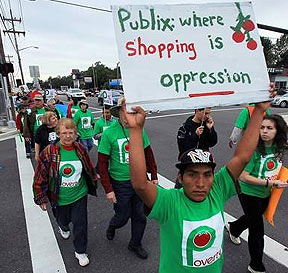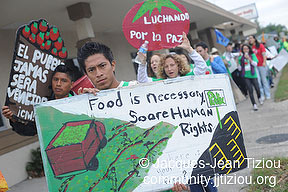 Already plans are underway for folks from Denver to participate in this important and exciting action. It will be a great opportunity for the Denver community to strengthen our connections with the workers in Immokalee and our commitment to the struggle for Fair Food. If you're interested in attending, contact us at DenverFairFood@gmail.com.CIW announces "Farmworker Freedom March," Tampa to Lakeland, Florida, April 16-18, 2010!
Already plans are underway for folks from Denver to participate in this important and exciting action. It will be a great opportunity for the Denver community to strengthen our connections with the workers in Immokalee and our commitment to the struggle for Fair Food. If you're interested in attending, contact us at DenverFairFood@gmail.com.CIW announces "Farmworker Freedom March," Tampa to Lakeland, Florida, April 16-18, 2010!March to call for: "Freedom from forced labor; Freedom from abuse; Freedom from poverty and degradation"
President Obama declared January, 2010, "
National Slavery and Human Trafficking Prevention Month," saying:
"Fighting modern slavery and human trafficking is a shared responsibility. This month, I urge all Americans to educate themselves about all forms of modern slavery and the signs and consequences of human trafficking. Together, we can and must end this most serious, ongoing criminal civil rights violation."
Join us this spring for an intensive campaign of education and action to end modern-day slavery in Florida's fields.
Details:
Farmworker Freedom March
* Three-day march of farmworkers and allies
* April 16-18, from Tampa to Lakeland (home of Publix)
* Route details and logistics to be announced soon
Background:The fight to end modern-day slavery has been gaining important ground in recent months. Ten months ago, Florida Governor Charlie Crist wrote these words in an
open letter to the CIW, after the Governor and his representatives met in Tallahassee with CIW members and victims of modern-day slavery cases:
"I have no tolerance for slavery in any form, and I am committed to eliminating this injustice anywhere in Florida. I unconditionally support the humane and civilized treatment of all employees, including those who work in the Florida agricultural industry. Any type of abuse in the workplace is unacceptable.
I support the Coalition's Campaign for Fair Food, whereby corporate purchasers of tomatoes have agreed to contribute monies for the benefit of the tomato field workers. I commend these purchasers for their participation..."
Three months ago, the Collier County Sheriff's Department joined with the CIW in organizing "
A Day without Slavery," a community event "aimed at providing seasonal farm workers and members of the Immokalee community with information about human trafficking and ways to identify victims of human trafficking." Speaking of the Immokalee farmworker community, Detective Charlie Frost told the Naples Daily News ("
Immokalee event geared toward raising awareness of human trafficking," Naples Daily News, 11/14/09):
“They are our eyes and ears out here,” Frost said. “They’re the ones that will be able to alert us to these trafficking type of situations. It’s important that they know they have rights as victims.”
And this month, President Obama declared January 2010 "National Slavery and Human Trafficking Prevention Month". The proclamation states, in part:
"The United States was founded on the principle that all people are born with an unalienable right to freedom -- an ideal that has driven the engine of American progress throughout our history. As a Nation, we have known moments of great darkness and greater light; and dim years of chattel slavery illuminated and brought to an end by President Lincoln's actions and a painful Civil War. Yet even today, the darkness and inhumanity of enslavement exists. Millions of people worldwide are held in compelled service, as well as thousands within the United States. During National Slavery and Human Trafficking Prevention Month, we acknowledge that forms of slavery still exist in the modern era, and we recommit ourselves to stopping the human traffickers who ply this horrific trade...
... The victims of modern slavery have many faces. They are men and women, adults and children. Yet, all are denied basic human dignity and freedom. Victims can be abused in their own countries, or find themselves far from home and vulnerable. Whether they are trapped in forced sexual or labor exploitation, human trafficking victims cannot walk away, but are held in service through force, threats, and fear. All too often suffering from horrible physical and sexual abuse, it is hard for them to imagine that there might be a place of refuge...
... Fighting modern slavery and human trafficking is a shared responsibility. This month, I urge all Americans to educate themselves about all forms of modern slavery and the signs and consequences of human trafficking. Together, we can and must end this most serious, ongoing criminal civil rights violation."
You can read the proclamation in its entirety
here. Its words reflect the fierce urgency of the fight to end this most violent form of exploitation.

The movement to end modern-day slavery is not an issue of partisan politics, and it's definitely not a labor dispute. It is a movement to defend one of our most fundamental human rights, and the CIW has been at the
forefront of that movement for many years.
Yet when we asked Publix to adopt the principles of the Campaign for Fair Food -- principles, including a zero tolerance policy for slavery, designed to eliminate forced labor and its causes -- Florida's largest supermarket chain turned its back.
Instead, Publix continued to purchase tomatoes from the very farms tainted by the latest slavery prosecution. When asked why, Publix spokesperson Dwaine Stevens told the St. Augustine Record:
"... the chain does purchase tomatoes from the two farms but pays a fair market price." ("Farmworkers protest supermarket tomatoes," 11/24/09)
But there is no "fair market price" for slavery, and there will be no end to modern-day slavery until companies like Publix stop turning a blind eye to human rights abuses in their suppliers' fields.
Help us send a message that Publix cannot ignore. Join us this spring for the Farmworker Freedom March, for a march you -- and Publix -- will never forget.
Check the CIW website
http://www.ciw-online.org/ more information on all the action this spring!
 In December 2009, Food and Society Fellow Sean Sellers challenged Steve Ells (pictured left), the CEO of Chipotle Mexican Grill, to a public debate on the merits of the Campaign for Fair Food. The challenge stemmed from Chipotle's ongoing refusal to partner with the CIW to address labor conditions in its tomato supply chain, and in response to misinformation about the CIW spread by Ells in recent high-profile speaking engagements.
In December 2009, Food and Society Fellow Sean Sellers challenged Steve Ells (pictured left), the CEO of Chipotle Mexican Grill, to a public debate on the merits of the Campaign for Fair Food. The challenge stemmed from Chipotle's ongoing refusal to partner with the CIW to address labor conditions in its tomato supply chain, and in response to misinformation about the CIW spread by Ells in recent high-profile speaking engagements.
